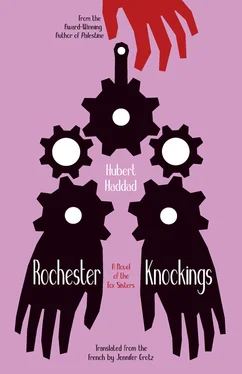As if collapsed upon herself, looking like a dropped puppet, she was stared at blankly by the maid. Finally Janet rushed to gently gather her up.
“A gentleman is here to see you, Miss!”
“At this hour?”
“He has come before, back in your mother’s day.”
Kate thanked the servant, intrigued by the sort of religious cornet that she had fastened to her head. In the entryway, Alexander Cruik made no excuse for his late intrusion.
“I dreamed about you,” he blurted out while removing his hat. “My dreams are thoughts that come to me from God. ‘ Departing dream, and shadowy form of midnight vision, ’ that’s from Thoreau. Do you have a few minutes you could grant me?”
Preceded by Janet who was holding a candlestick, Kate invited the preacher into the downstairs living room. She asked for a fire, some light, and drinks, troubled to see this austere figure emerging from out of the night. With his silver hair standing in a crown on the top of his head, his eagle’s profile, the blue edge of his otherwise colorless gaze and the lanky presence of a meadow runner, the missionary had a little bit of the presence of an Iroquois Indian ghost of the Great Lakes disguised in the strict suit of a Puritan. His voice, made hollow by preaching, had an unusual sweetness.
“Don’t worry, I’m just stopping by. I just wanted to be sure. .”
He cast a quick glance at a photographic print of the three sisters framed on the wall, the youngest standing between her seated older sisters, who, despite their difference in age, seemed nearly to be twins — identical duenna hairstyles and that stoic expression of waiting for the blinding blow from the photographer, that Cyclops hiding under the drape of a Spanish prelate.
“Loneliness is not good for you, my little Kate, you are cloistered in a ring of ghosts here. You must get out, spend time among the living. .”
“Janet’s enough for me.”
“That sad caryatid? I strongly doubt it. You need exchange, fraternal awakening. Exclusive commerce with the afterlife can only lead to depression and madness. .”
“Margaret will come back.”
“Your sister has thirsted for independence ever since Leah moved to New York. I learned that she is getting along with some success in Pennsylvania. But she is not built for the role, I’m afraid.”
Alexander Cruik did not press the subject. He deciphered with apprehension how the delicate features on this young girl’s face were locked inside memory, the heart’s fortress. Without her really knowing it, her sisters had only variously pursued the supernatural impulse that lived inside Kate for their own worldly ends. She suffered from a nervous condition that aligned her with other dimensions; her nerves reached out long as antennae, vibrating too intensely as energies concentrated themselves there like on Dr. Franklin’s metallic rods. But instead of flowing back into the earth, the electric fluid accumulated inside her. Could one protect oneself from lightning by holding a lightning rod in both hands? The evangelist would have loved to snatch this delicious child from the funereal silence of this house and take her with him, far away to the great plains where the Great Spirit breathes freely. Hey-a-ahey! Hey-a-ahey!
“I have an exciting message for you,” he said finally in a soft voice. “That’s why I allowed myself to trouble you. I’ve just returned from a meeting in New York for the protection and defense of the American Indians killed on their reservations in many states of the Union. During this visit, I had the occasion to be invited by Mrs. Underhill, your sister, and her husband, who is an influential man. Leah organizes private séances that are highly prized by polite society. Thus it was that I was able to speak with Horace Greeley of the New-York Tribune. You know that this great man represented our state in Congress for many years. He spoke to me for a long time about you, Kate. .”
“I know him, of course, he was very generous when Mr. Phineas Taylor Barnum, the circus entrepreneur, had invited all three of us.”
“Well, he would like to invite you personally this time. Mr. Greeley thinks it would be criminal to abandon you to the merchants of the temple like Mr. Barnum, and to leave fallow your psychic gifts. Much of your instruction still awaits, Kate. .”
“I’ve read Fenimore Cooper and Longfellow, you know.”
“Longfellow? We all love him. I don’t think anything is better than Songs of Hiawatha, listen to this:
And the desolate Hiawatha
Away amid the forest,
Miles away among the mountains,
Heard that sudden cry of anguish,
Heard the voice of Minnehaha
Calling to him in the darkness,
“Hiawatha! Hiawatha!”
Kate looked with surprise at her visitor and, as if the words were being dictated to her, continued the poem in a weary tone:
Then they buried Minnehaha
In the snow a grave they made her
In the forest deep and darksome
“I myself have spent time with the Ojibwa Indians of whom the author speaks so well. .” Alexander exclaimed, distracted by this evocation before continuing, mezza voce : “However tonight is not about the Ojibwas but about your future, my dear Kate! Mr. Greeley believes in you, he thinks that you deserve better than cabinet consultations. He appears determined to take charge of your affairs and support you financially and morally in your studies. Isn’t that wonderful?”
“I don’t know, why didn’t he address me directly?”
“A man like him is very busy with his duties. To be frank, he asked me to sound you out. If you accept the idea, you will be hearing from him very soon. .”
Nothing resembles the life of a hero. The most intrepid man still has the heart of a child. Margaret regrets having burned her journal because of the final pages where she had recorded, or rather affixed, like rare or common flowers in a herbarium, the first moments of their love, back when intimacy was still limited to letters and some sighs exchanged lip to lip. She had met doctor Elisha Kent Kane at an evening gala in Philadelphia. It was a celebration for the victory of Democratic abolitionist William Bigler in the governmental elections, but she cared little about the event and the heated debates that erupted here and there about the indignity of agricultural states of the south and Republican potentates. Here at this party, where she was finally left alone with the spirits, she had just abandoned the lively hustle, between the orchestra and the dance floor, when she abruptly found herself facing him. Was that before her mother had died? She no longer remembers much. The stranger’s gray eyes immediately invaded her mind and soul. He had a large curly beard that mingled at the temples with waves of long hair, the head of a prophet framing an intelligent mind and of a severe beauty. “We know each other, Miss Fox,” he had said to her just after the long look they’d exchanged. Her anonymity was suddenly broken, but he did not bother her about her public life. Undoubtedly they danced, and discreetly entwined, thoughtfully felt the possibility of happiness.
She saw him two or three more times in Philadelphia. Doctor Kane, so reserved and careful of judgment, was also an adventurous scholar, a hero of the Mexican War, a tireless traveler, and an explorer returned from Africa and from a relief expedition in the Arctic area. But his ambitions remained unfulfilled. Talents, knowledge, diplomas, and successes supported by a nice family fortune had not yet conjoined with that brilliant beam of fame that would have finally given him proof of his native election and salvation. A preceptor of his own destiny, Doctor Kane secretly lacked confidence in himself. From anywhere in the world, he could hardly escape its clutches; Margaret, who had suffered plenty of servitude, had ample time to see it in this magistrate’s son, affecting the independence of a rationalist mind. Audacious and refined, Elisha loved poetry and the arts as much as the crossing of a Himalaya or a sea of ice; distant sirens called him and, having just survived a shipwreck or scurvy, he would already be dreaming of the next departure with an incomprehensible longing. Back under the Stars and Stripes, the weight of Puritan conformity — the Victorian version of which he’d had a taste of in London — had caught hold of him at the same time as ailments from the Tropics and the persistent mortifications of an education based on the necessity of consideration.
Читать дальше












